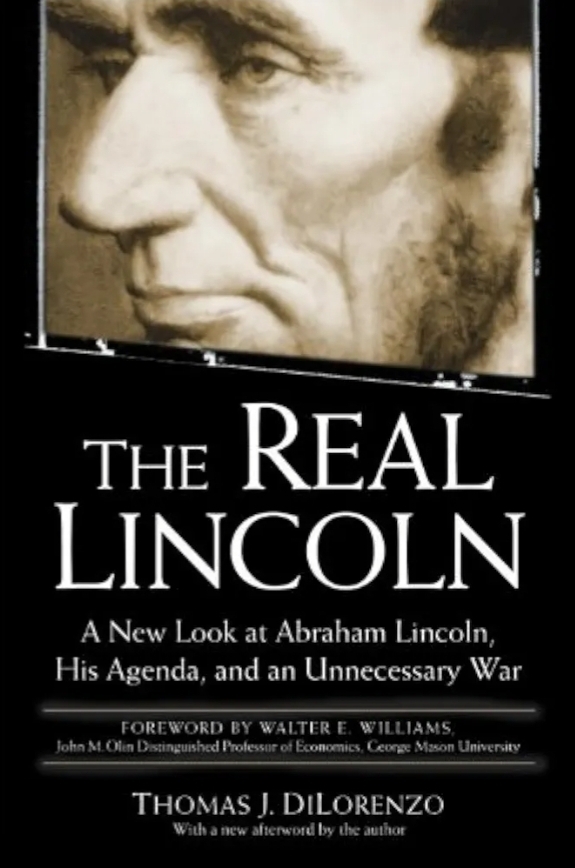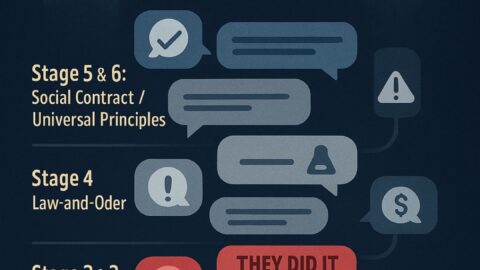“The Real Lincoln: A New Look at Abraham Lincoln, His Agenda, and an Unnecessary War” by Thomas J. DiLorenzo presents a revisionist view of Abraham Lincoln, challenging the conventional narrative that portrays him as a heroic figure who preserved the Union and abolished slavery. DiLorenzo argues that Lincoln’s true motivations were more politically and economically driven, and that the Civil War was an unnecessary conflict instigated by Lincoln’s agenda for centralization of power. Below is a detailed overview of the book’s major themes, arguments, and conclusions:
Central Thesis:
DiLorenzo contends that Abraham Lincoln was not the humanitarian and liberator as commonly portrayed, but rather a political opportunist whose actions led to the unnecessary deaths of hundreds of thousands and the destruction of the principles of decentralized government. According to the author, Lincoln’s primary goal was to consolidate federal power, not to end slavery. The war, DiLorenzo argues, could have been avoided, and slavery could have been ended without the immense bloodshed of the Civil War.
Major Themes and Arguments:
Lincoln’s True Agenda: Centralization of Power:
- DiLorenzo argues that Lincoln sought to centralize power in the federal government and diminish the sovereignty of the states. This drive for centralization, he claims, was the true motivation for Lincoln’s war against the South, rather than a moral crusade against slavery.
- He claims that Lincoln violated constitutional principles, especially those concerning states’ rights and the limits of federal authority, in order to achieve his goal of a more powerful, centralized national government.
Economic Interests and the Protection of Northern Industry:
- DiLorenzo emphasizes that one of Lincoln’s key motivations was the protection of Northern industrial and economic interests, particularly through the imposition of high tariffs.
- The Southern states, which relied on free trade and low tariffs to export their agricultural products, were strongly opposed to these tariffs. According to DiLorenzo, Lincoln was more concerned with keeping the South in the Union to ensure continued tariff revenues that would protect Northern industries than with any moral issue regarding slavery.
The Unnecessary War:
- The book argues that the Civil War was entirely unnecessary and could have been avoided. DiLorenzo points out that other countries (such as Britain and Brazil) ended slavery through peaceful means rather than war, and suggests that Lincoln could have done the same.
- Lincoln’s refusal to allow the Southern states to secede peacefully is viewed by DiLorenzo as a violation of the Founders’ vision of a voluntary Union. The Southern states had the right to secede, DiLorenzo argues, and Lincoln’s decision to go to war was motivated by a desire to maintain federal dominance, not to preserve the Union for the sake of liberty or freedom.
Lincoln and Slavery:
- DiLorenzo challenges the traditional narrative that Lincoln was primarily motivated by a desire to end slavery. He argues that Lincoln’s Emancipation Proclamation was largely a military strategy, intended to weaken the South by encouraging enslaved people to flee, rather than a genuine effort to free slaves.
- Lincoln’s views on race, which DiLorenzo claims were not as progressive as many believe, are also discussed. He highlights Lincoln’s earlier statements about his support for colonization (the idea of sending freed slaves to colonies in Africa or elsewhere) and his reluctance to advocate for full equality between blacks and whites.
Constitutional Violations:
- DiLorenzo argues that Lincoln violated the Constitution in several ways during his presidency. These violations include suspending habeas corpus, imprisoning political opponents without trial, censoring newspapers, and instituting martial law in parts of the North.
- These actions, according to DiLorenzo, were part of Lincoln’s broader goal of consolidating federal power and suppressing dissent. He portrays Lincoln as a leader who disregarded constitutional limits in favor of preserving and expanding the power of the federal government.
The Legacy of Lincoln’s Presidency:
- DiLorenzo believes that Lincoln’s legacy has been misrepresented by historians who have lionized him as a great emancipator and a defender of democracy. In reality, according to DiLorenzo, Lincoln’s presidency marked the beginning of the expansion of federal power at the expense of individual liberties and states’ rights, a trend that continued into the 20th century.
- He argues that Lincoln’s actions during the Civil War paved the way for the growth of the federal government, leading to the erosion of the principles of limited government that were central to the Founding Fathers’ vision for America.
Key Points of Criticism in the Book:
Lincoln’s Racial Views:
- DiLorenzo points to Lincoln’s earlier speeches and policies, particularly his support for colonization and his hesitation to grant civil rights to freed slaves, as evidence that Lincoln was not truly committed to racial equality.
- He suggests that Lincoln’s position on slavery evolved more out of political necessity than moral conviction.
The Emancipation Proclamation:
- DiLorenzo asserts that the Emancipation Proclamation was more symbolic than substantive, as it only applied to enslaved people in Confederate territories, not in the Union slave states or areas of the South already under Union control.
- He argues that the proclamation was a war measure aimed at destabilizing the South rather than a genuine attempt to end slavery across the entire nation.
Secession and States’ Rights:
- One of the central arguments in the book is that the Southern states had the right to secede, as they believed the Union was a voluntary compact between sovereign states. DiLorenzo emphasizes that the Founding Fathers had envisioned the possibility of secession, and that Lincoln’s decision to wage war to prevent it was an overreach of federal authority.
- DiLorenzo suggests that Lincoln’s refusal to allow secession was motivated by economic and political interests, particularly the desire to maintain federal tariff revenues, rather than by any commitment to preserving democracy.
Repercussions of Lincoln’s Actions:
Expansion of Federal Power:
- DiLorenzo argues that Lincoln’s presidency marked the beginning of the rise of a more centralized federal government, with more control over the states. The principles of limited government and states’ rights were weakened as a result of Lincoln’s policies.
- The trend toward a stronger federal government, according to DiLorenzo, continued after Lincoln’s death and was further expanded by subsequent presidents during crises such as the Great Depression and World Wars.
Undermining Constitutional Liberty:
- The book portrays Lincoln’s actions during the Civil War, particularly his suspension of habeas corpus and other wartime measures, as precedents for future abuses of executive power.
- DiLorenzo argues that the constitutional liberties that the Founders fought for were undermined during Lincoln’s presidency and that Lincoln’s disregard for the Constitution set a dangerous precedent for future leaders.
Criticism and Controversy:
- “The Real Lincoln” has been widely criticized by many historians and scholars who argue that DiLorenzo’s portrayal of Lincoln is overly simplistic and selective. Critics argue that the book downplays the significance of slavery as a central issue of the Civil War and presents a distorted view of Lincoln’s motivations and actions.
- DiLorenzo’s emphasis on economic motivations and states’ rights is seen by some as an attempt to reframe the Civil War in terms that minimize the moral and social significance of slavery and its abolition.
In “The Real Lincoln: A New Look at Abraham Lincoln, His Agenda, and an Unnecessary War”, Thomas J. DiLorenzo presents a highly critical and revisionist account of Lincoln’s presidency, arguing that his true legacy was the centralization of federal power at the expense of states’ rights and individual liberties. DiLorenzo suggests that Lincoln’s primary goal was political and economic control, not the abolition of slavery, and that the Civil War could have been avoided. While the book offers an alternative perspective on Lincoln’s legacy, it has generated significant controversy and debate, particularly regarding its interpretation of historical facts and its framing of the Civil War.







